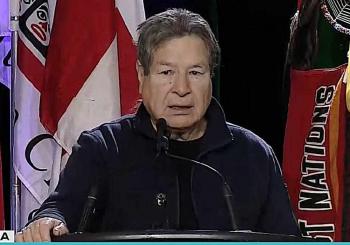Image Caption
Summary
Windspeaker.com Contributor
The Association of Iroquois and Allied Indians will be working toward the future while getting reacquainted with old ways when its seven-member nations come together for an Indigenous Transformation Summit this week.
“We are using the beliefs that we have had for generations and applying them to modern-day concerns and problems,” said AIAI Deputy Grand Chief Gordon Peters.
Two days of the three-day summit will focus on moving forward in discussions with the Ontario government on jurisdiction over tobacco.
“We’ve been at this discussion for a couple of years,” said Peters. “Right now we’re getting ready to make a final decision of exactly what we want to be able to do. This is crunch time for us.”
To that end, Jan. 21 will be spent with economist Fred Lazar from the Schulich School of Business and legal scholar Sara Mainville of OKT Law.
Peters points out that Ontario wants AIAI member nations to collect provincial sales tax on the sale of tobacco products and they want price parity between tobacco products allocated from the province and tobacco products manufactured by the First Nations.
“Our communities have already said they are not interested in being tax collectors. But that’s (in) the context of collecting federal and provincial taxes,” he said.
Peters says the tobacco products manufactured by AIAI’s southern-most member nations outsell the provincially allocated products, although the sale of tobacco products has declined in recent years.
“But it’s still a problem because the government of Ontario still thinks that they’re losing taxes. So that’s what we’re trying to sort out. We’re trying to come to a conclusion,” he said.
Peters says they will be looking at existing models for agreements between First Nations and provincial and federal governments on tobacco tax.
Even if there isn’t a resolution at the end of the three days to present to the provincial government, Peters says there will be an indication as to what direction the communities will be moving.
“I’m sure that most of them will have to go back to their communities to get their direction on that. We don’t know that at this stage,” he said.
Peters points out that while AIAI creates the environment for negotiations, actual negotiating is carried out by chiefs and councillors dependent on community consultation and what each First Nation decides.
While the immediate focus is on the agreement with the Ontario government, Peters says the profit realized from the sale of tobacco manufactured by the First Nations will also be examined "down the road." Right now, he says, that profit goes primarily to the businesses and the tobacco manufacturers. First Nations communities, however, want a share.
“Now we’ve done an economic study on that and we know exactly what (the profit) is and we do want a share of that and that will be part of our discussion going down the road,” he said.
“We don’t want tobacco to be an individual right. We want it to be a collective right for our communities.”
Sandwiched between discussions of tobacco taxes and negotiating with the province will be a “run-through” of a traditional meeting, which is a follow-up from last year’s summit. It’s an important exercise, says Peters, allowing leaders to see that using traditional practises isn’t difficult and that these processes promote inclusion and give voice to everyone.
“You’ve got to give people a different perspective of what it is and how it is we should be behaving. Our position has always been, and this is what we’ve been fighting with the feds over for a long time, is that if we’re operating under the Indian Act we’re operating under a mechanism created by the federal government,” said Peters.
“By looking at our own governing process and beginning to have a hands-on approach on our own governance process, we’re hoping it will allow our communities to be able to advance what they’re doing. Some are already talking about this. Some are already trying to figure out how to be able to do some things.”
Peters stresses embracing traditional governance is not about opting out of the Indian Act, but about restructuring.
“If you opt out (of the Indian Act) you have to negotiate with the feds to opt into something else, but it’s still federally controlled. Our communities have said to us they don’t want to do any of those things…. We see it as establishing those systems for ourselves as who we are,” he said.
The seven member AIAI First Nations are Batchewana First Nation, Caldwell First Nation, Delaware Nation, Hiawatha First Nation, Mohawks of the Bay of Quinte, Oneida Nation of the Thames, and the Wahta Mohawks. The Indigenous Transformation Summit runs from Jan. 21 to Jan. 23

